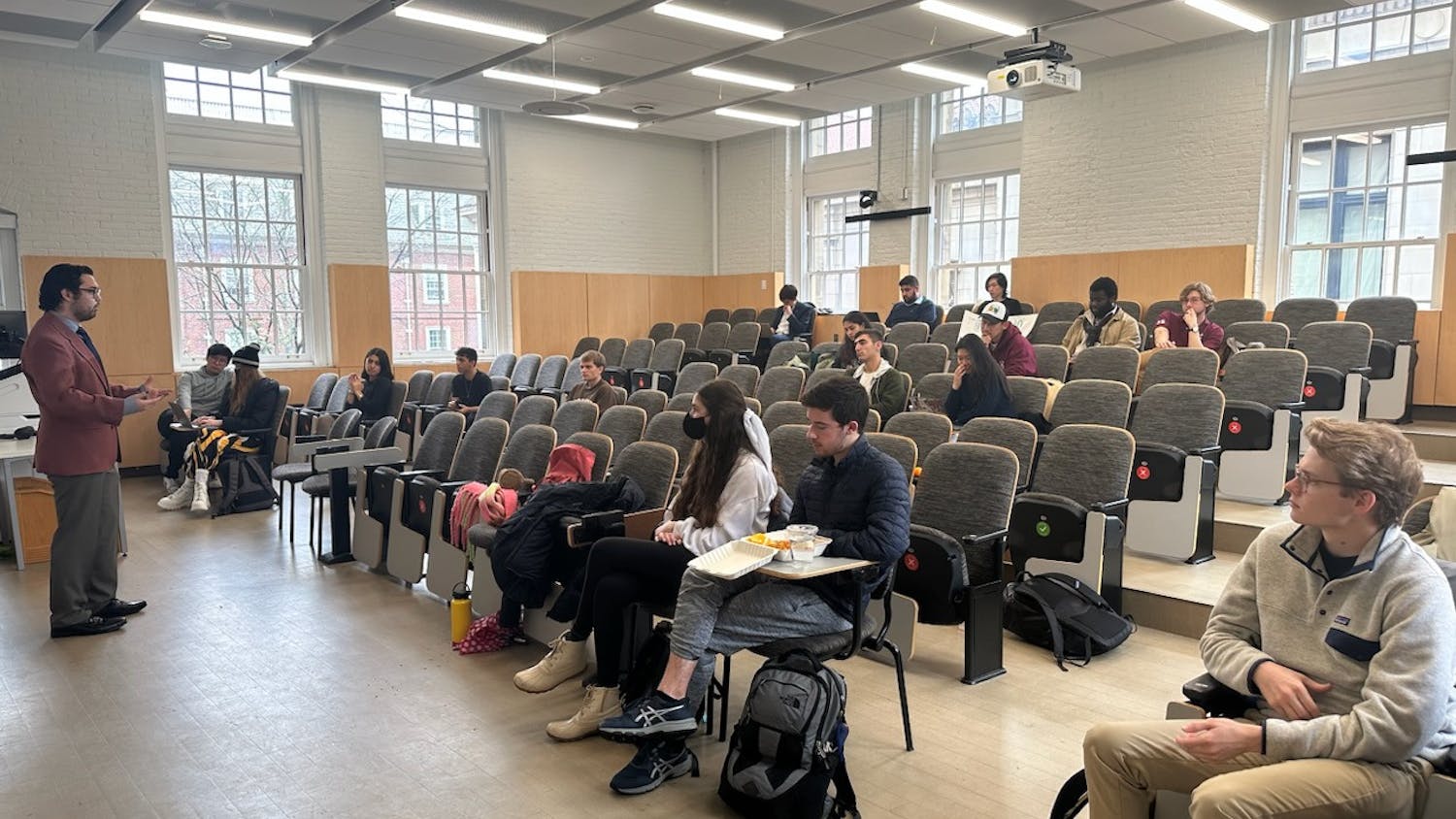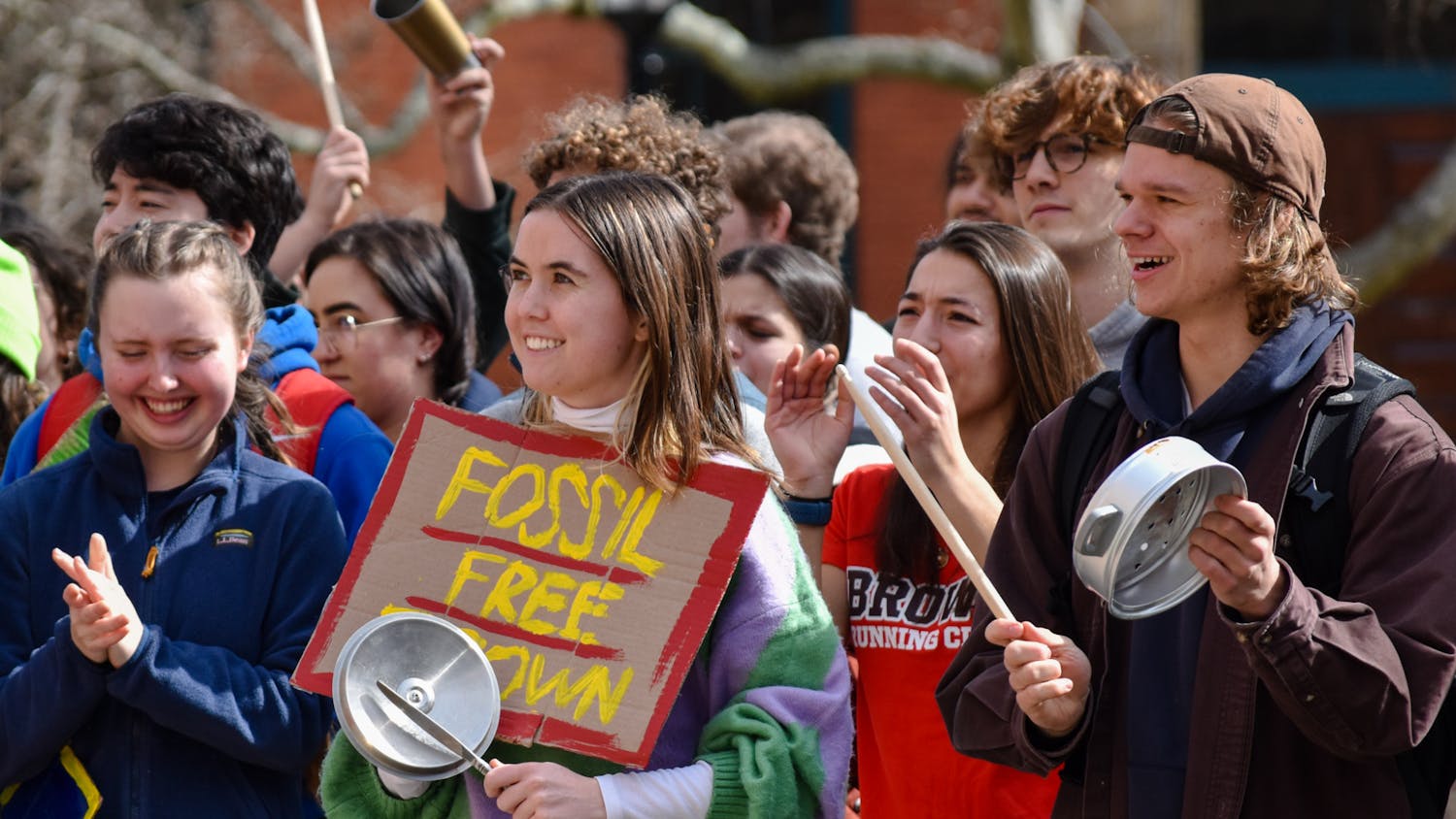“The heat is on,” the front page of the Nov. 3, 1989 Herald, paraphrasing a speech on campus about climate change. “And it’s getting hotter.”
College Hill is no stranger to climate activism. Since the 1970s, Brown has been a hub for discourse on environmental issues. Most recently, students have advocated for a complete dissociation from the fossil fuel industry, called for a new sustainability certificate and founded environmentally-focused student groups.
The Herald reviewed its archives and spoke with current activists, faculty and staff to trace the history of climate activism on Brown’s campus.
1970s: A ‘fundamental issue facing the world’
Environmental issues garnered national attention in the 1970s, a decade marked by the first Earth Day , the of the Clean Air Act and the of the Environmental Protection Agency. Between 1969 and 1971, public opinion polls a 2500% increase in support for environmental protection, according to the EPA.
But for students on College Hill, domestic environmental activism seemed performative, particularly as people turned away from the anti-Vietnam War movement in favor of publicly accepted reform efforts.
“The air (in Providence) is dirty, the water is even filthier; but thousands die each week in Vietnam while we wreak ecological disaster on that country,” an April 20, 1970 Herald editorial titled “As Thousands Die.”
For the editorial’s authors, the solution to environmental challenges was “vigorous lobbying and election pressures, … not a symbolic Earth Day.”
But not all University students shared the view that foreign policy and the anti-war movement was more important than domestic environmental efforts.
Calling the editorial’s argument “incredibly myopic,” Carolyn Smith ’71 and Alan Birnbaum ’71 a dissenting opinion on the same day. “There is no more fundamental issue facing the world today than the environmental one.”
On April 21, 1970, Roger Rittmaster ’72 wrote in a that "Earth Day, though a symbolic gesture, … achieved dramatic results” for conservationists across the country.
1980s: A ‘pantheon of awareness’
The 1980s brought greater national of global warming, further fueling climate activism on campus.
In 1985, students taking an environmental studies class requested a space to practice sustainable living habits. West House, a former boarding house for female commuter students, was then into an environmental program house, The Herald previously reported.
In 1989, three student groups — the Brown Nuclear Education Project, Global Outlook and the Brown Environmental Network — launched Global Warming Information Week, a for climate change, according to a Nov. 2, 1989 Herald article.
The week promised “a number of informative lectures and discussions on a topic which has far-reaching implications literally for the future of the world,” according to a from the same day.
The week opened with a lecture from George Woodwell, then-director of the , who for an immediate halt to greenhouse gas emissions. “Nobody knows for sure how rapidly the earth will warm,” he said.
2000s: ‘A policy of climate neutrality’
The 2000s ushered in a new push for climate advocacy on campus, this time dedicated to altering the University’s institutional policies.
In 2006, the Brown Environmental Action Network launched its Empower campaign, calling on the University to “adopt, in its next budget cycle and no later than 2008, a policy of climate neutrality: net-zero global warming emissions.”
The following semester, the University’s Energy and Environmental Advisory Committee recommended that Brown reduce its greenhouse gas emissions to reach carbon neutrality, The Herald previously reported. In alignment with the EEAC report, the Department of Facilities Management was allocated $5 million to improve energy efficiency and purchase carbon offsets.
In a Jan. 24, 2008 press release, the University to reduce greenhouse gas emissions to “42% below 2007 levels by 2020” and limit “energy consumption for all newly constructed facilities to between 25% and 50% below the standard required by state code.”
2010s: ‘Consigning our generation to life on an inhospitable planet’
In the 2010s, environmental activists on campus mobilized around a new demand: divesting the University endowment from fossil fuel-related companies.
“We know that Americans must stand up to the fossil fuel industry before it’s too late,” wrote Brown Divest Coal — a student group founded in 2012 — in an Oct. 3, 2012 Herald op-ed. “We can start right here at Brown by divesting our endowment from the 15 coal companies with the worst environmental and social records.”
Divest Coal held multiple rallies in 2012 and 2013 and hosted a speech by environmentalist Bill McKibben P’16 to mobilize the student body. “If you’re going to green the campus, there is no logical reason you would not green the portfolio,” he said.
In an April 15, 2013 op-ed to The Herald, President Christina Paxson P’19 P’MD’20 wrote: “I hope that our community will approach the matter of divestiture from coal and other fossil fuels with the high degree of openness, respect and intellectual integrity that characterizes” Brown.
In October 2013, the Corporation — the University’s highest governing body — decided not to divest the endowment, leading to a Divest Coal silent sit-in at University Hall.
“We regret your continued and deliberate willingness to invest in an industry quickly consigning our generation to life on an inhospitable planet,” the organization later wrote in a Herald op-ed.
In 2019, the University a goal to “cut its campus greenhouse gas emissions by 75% by 2025, and to achieve net-zero no later than 2040” through a four-phase plan that includes and a , as well as fuel and infrastructure updates to the University’s central heating.
Today: ‘Essential partners in helping us to fulfill our mission’
In a March 2020 letter to the Brown community, the University pledged a full divestment from fossil fuels in its endowment — nearly seven years after initially declining to do so.
“To date, 90% of investments in companies that extract fossil fuels have been sold, and the remainder is being liquidated as it becomes possible to do so,” Paxson wrote in the letter.
“The enormity of this threat has become increasingly clear over time,” she added. “Without a rapid transition away from fossil fuels on a global scale, it will become impossible to avert disastrous consequences for humans and the natural environment worldwide.”
In 2021, the University unveiled a that includes deadlines for reducing emissions, pollution and water use.
With 17 years remaining until the University’s 2040 deadline to achieve net-zero emissions, the fight against climate change on College Hill continues.
On Feb. 27, Sunrise Brown launched its DIRE campaign, calling for the University to dissociate from the fossil fuel industry and reinvest in Rhode Island communities.
In its accompanying “Dissociate Now” , published last month, Sunrise made three key demands: Prohibit fossil fuel-associated companies from donating and funding research at Brown, ban fossil fuel-related recruiting on campus and offer fossil-free investment options in retirement plans for University employees.
Caitlyn Carpenter ’26, co-author of the report, explained that written documents like the DIRE report can be passed down to future student activists and serve as a “legacy of different movements” on campus.
Sunrise is one of many student groups — including SCRAP, Students Learning Urban Gardening and West House — promoting sustainability on campus. Recently, the Brown Renewable Energy and Sustainability Society proposed a new certificate in sustainability.
Student input has always informed sustainability efforts on campus, wrote Jessica Berry, assistant vice president of the Office of Sustainability and Resiliency, in an email to The Herald.
Kim Cobb, director of the Institute at Brown for Environment and Society, said that students helped develop the institute’s new , which sets goals regarding environmental education, research, impact and capacity-building.
“Each year I am amazed at the drive by the Brown community to take steps toward progressive environmental change,” Berry wrote.

Ryan Doherty is a Section Editor covering faculty, higher education and science & research. He is a sophomore concentrating in chemistry and economics who likes to partially complete crosswords in his free time.




